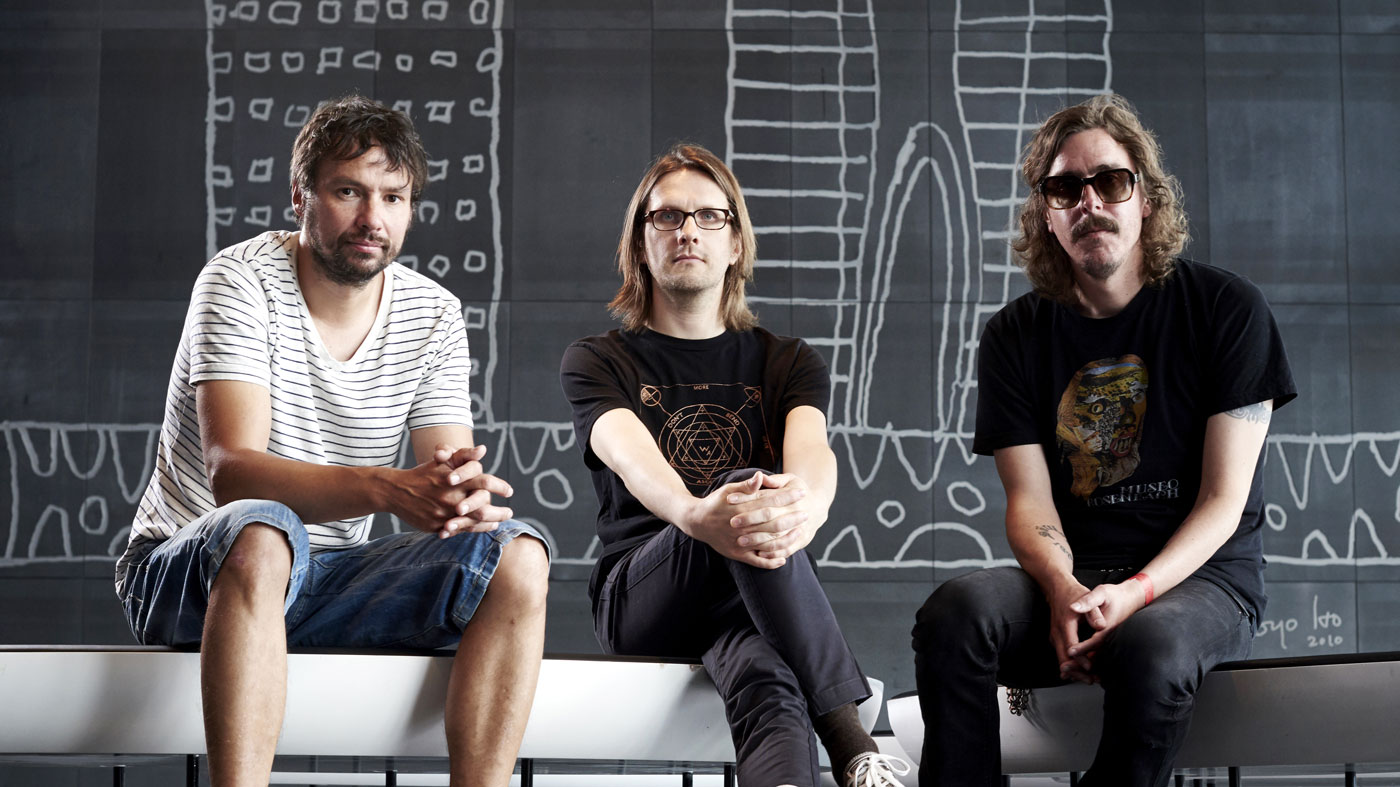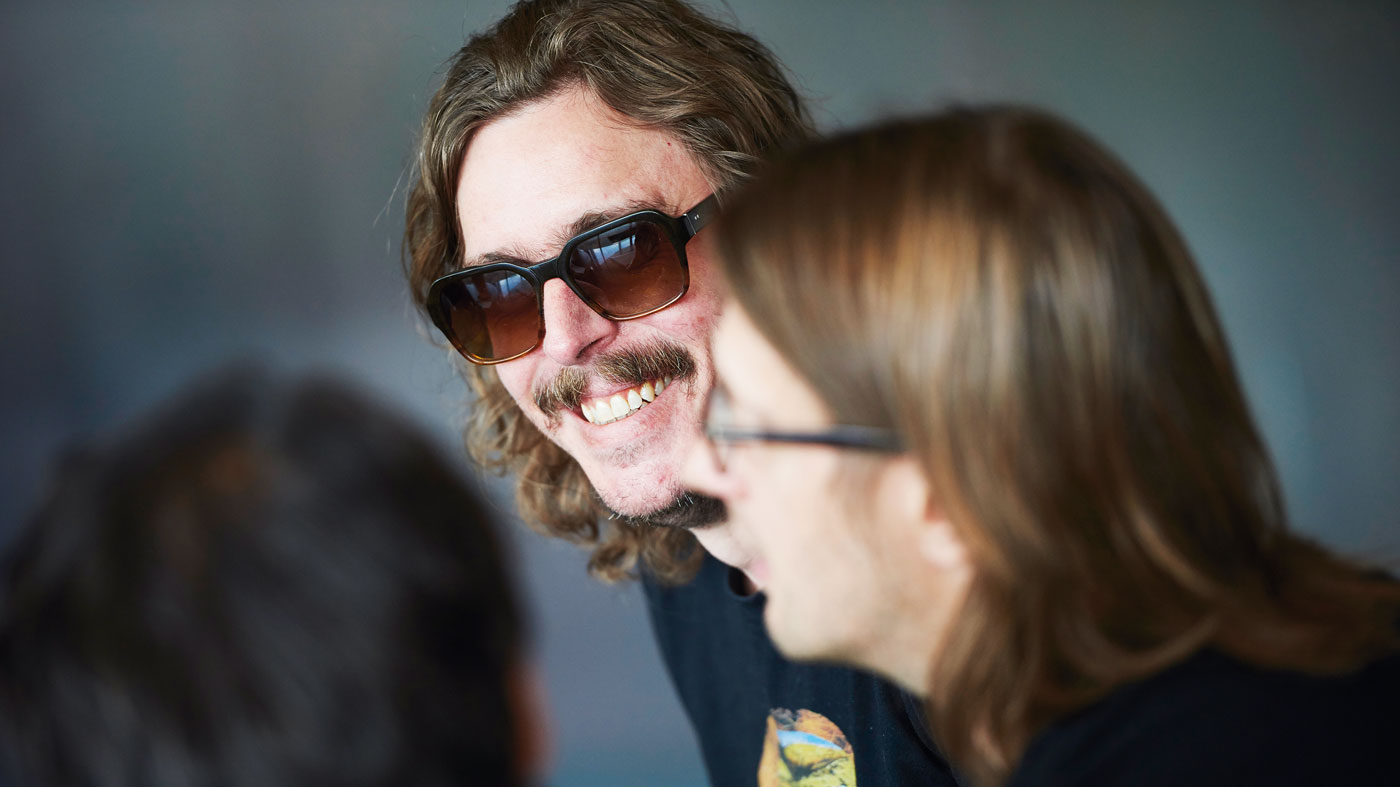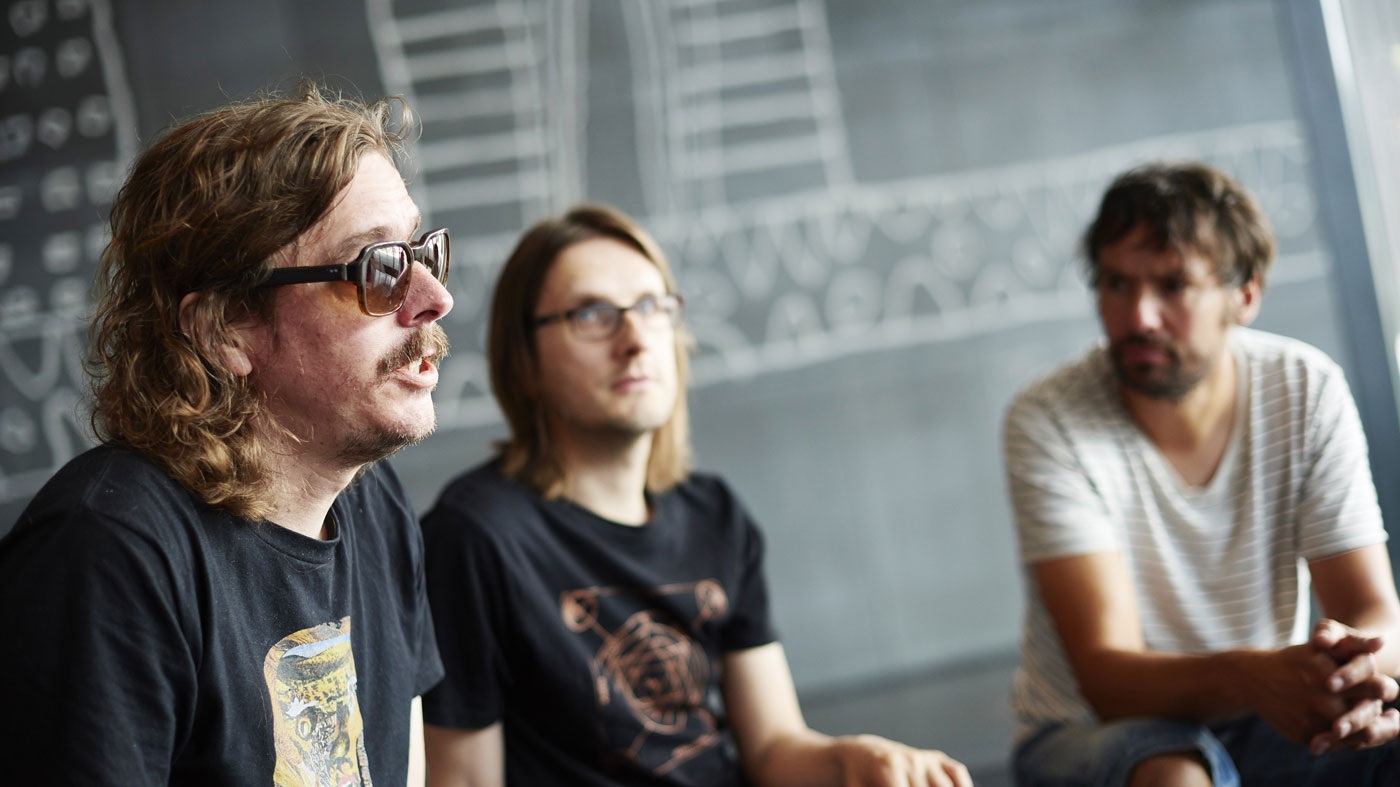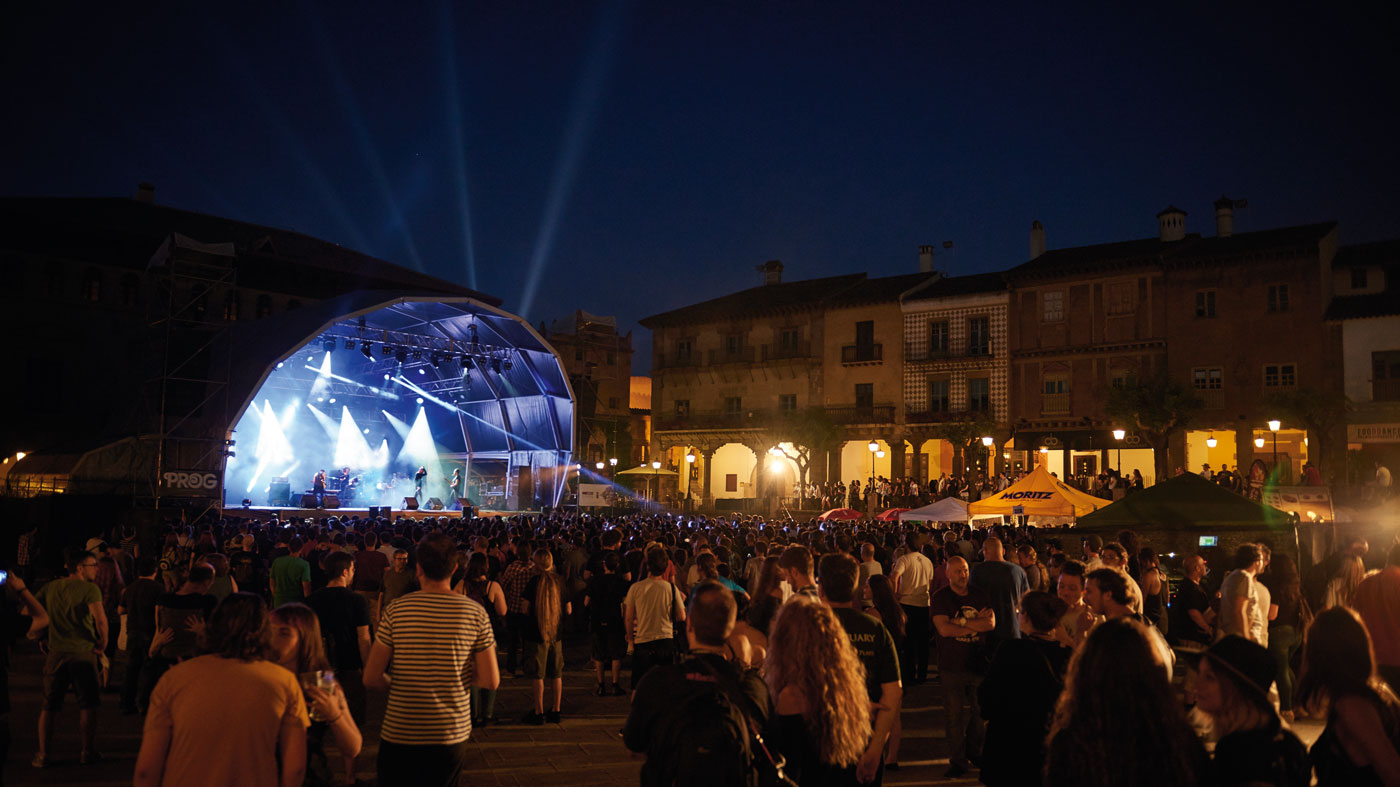Prog round table: Steven Wilson, Mikael Akerfeldt and Bruce Soord in conversation
Three giants of modern progressive guitar talk

Introduction
Three progressive rock visionaries gather with us in baking hot Barcelona to muse over recorder lessons, slap bass bans and taming shredders...
The Be Prog! My Friend festival is a hard proposition to argue with. Set in the hazy sunlit square of Barcelona's historic and quite stunning Poble Espanyol, it certainly beats the sodden mud of the British festival season. And the opportunity it offers to grab a cool mojito and see three of progressive rock's modern kingpins on the same bill is irresistible.
I learned so much from mixing these albums made at a time when recording was basically, get a bunch of guys in a room - Steven Wilson
It was also our chance to coax Steven Wilson, Opeth's Mikael Akerfeldt and The Pineapple Thief's Bruce Soord towards our table for their first ever interview together...
You were all involved with the recent remixes of Opeth's Damnation and Deliverance albums for their reissue - does dissecting other artists' classic albums give you an extra insight as a musician?
Steven: "For me it's an education. I've done albums going back to the late 60s and it's an education to deconstruct and reconstruct music like that. And also that music was made in a completely different era, a completely different recording philosophy.
"I learned so much from mixing these albums made at a time when recording was basically, get a bunch of guys in a room, play together. Minimal overdubs - there's your album. And that blew my mind in a way because, like these guys, I'd grown up with computer recording where you're unlimited in the amount of tracks you can do. And you kind of get an okay guitar sound but you track it 12 times and it sounds massive.
"These guys couldn't do that. They had to get one massive guitar tone because they couldn't afford to double track it, because they didn't have enough tracks. And that's just a completely different way of thinking. And so for me it was really an education to mix those old records."
Bruce: "Those early Yes ones, like Fragile - you did Fragile didn't you, Steve?"
Steven: "Yes I did."
Bruce: "How many tracks were they using then?"
Steven: "16. They were being very economic."
Bruce: "So did they bounce down stuff?"
Steven: "They did bounce down, but still most of what you're hearing when you hear that record is what they played live in the studio. And I'd say 25 per cent at most is tracked [overdubbed]."
Bruce: "Because when I was [remixing] Deliverance, that was an early Pro Tools session... but even that wasn't many tracks actually."
Mikael: "I can't remember. I didn't even know who had the tapes..."
Steven: "You didn't even know what was going on when you were making that record. I remember you were like in another place because your grandmother had passed away... you were fucked up..."
Mikael: "And I can't remember much. Andy Sneap did the original mix so once they started talking about this thing that [Bruce] mixed it was, where is the album? Whose got it? Who's got the files?"
Don't Miss
Steven Wilson on taming Guthrie Govan and Hand. Cannot. Erase.

Back to the roots
Going back to your roots, was guitar your first instrument?
Mikael: "It was the recorder for me, but not my choice! I wanted to play guitar and take guitar lessons and my parents said, 'Yes' and then after school one day, I was in second grade maybe, someone came to fetch me in the classroom saying that I had a music lesson... recorder."
Someone came to fetch me in the classroom saying that I had a music lesson... recorder - Mikael Åkerfeldt
Bruce: "But did you get good at recorder?"
Mikael: "I could play... but no I wasn't good. I actually learned to read some music so I could play a melody, in Swedish it basically translates into 'buy a hotdog'. And I could play that [hums it]. It was just three notes."
Steven: "Aren't there recorders on Fernando?"
Mikael: "Yes. That was me, too - I did that."
Steven: "I had no interest in playing the guitar, and I still don't actually. This is a slightly evasive way to answer your question, but my first instrument was a tape recorder because I was really interested in what you could do with sound. And actually this comes back to my real feeling of what I do, I write and produce music - I'm not a musician.
"The guys in my band are much better musicians than me because I'm not really interested in being a 'musician'. I like the idea of being an auteur, for want of a possibly-couldn't-be-more-pretentious-word, that's kind of what I feel, and I started experimenting with a reel-to-reel tape machine that my dad had and making silly sounds. So in a sense I feel that was my first instrument."
Bruce: "When was that?"
Steven: "That was in the late 19th century... No, it would have been the late 70s. It was still reel-to-reels but I think my dad had one of the early cassette players. What about you Bruce?"
Bruce: "It was a guitar, a Marlin Sidewinder. A terrible, terrible thing. It took me years to figure out how to play it and I never had any tuition, my technique is terrible and I can't read music. But then, like [Steven] I really then got into songwriting. And when you're a songwriter it's just a tool.
"So I was never the guy who was... well I did try for a bit, in the Joe Satriani, Steve Vai days, I wanted to do that [widdles] but I couldn't do it, or I didn't have the patience - so it just became a tool for writing songs.
"And then you end up, because you're a songwriter, being able to find your way around a keyboard and then when computers came around everything was there to write songs. So I think that's why I'm similar in that I'm not particularly a great guitar player. I get other people to play guitar."

Do songwriters make good musicians?
Mikael: "It's great, like Steve said, the band - Opeth in my case - they're great musicians. I'm horrible..."
Steven: "I think, like me and Bruce, you're instinctive about the way you approach music. You're not a technician, you don't have the chops, but for some people a great musician would be that; someone who's naturally instinctively able to make great music. I would question, [Bruce] mentioned [instrumental shredding], that's not music for me, that's science. There's nothing musical about that for me at all.
Music is something that touches your heart, not appeals to your intellect - Steven Wilson
"Music is something that touches your heart, not appeals to your intellect; 'Wow listen to how many notes he's playing there.' That for me was always the problem with those so-called musicians, it was reducing music to this level of an Olympic sport. Which unfortunately has only got worse in the YouTube generation, where you can go on there and find a five-year-old kid who could play all three of us out the park in terms of his technique. He's never going to produce a single note of music that anyone's ever going to want to listen to."
Bruce: "I had a kid send me a video of playing and it was seven-string, and he was doing all this stuff. And I said, 'There's some really nice melodies in there, do you want to turn it into a song?' Because you're only going to get guitar nerds that are going to want to listen to that."
Mikael: "Guitar nerds, too - they're special. A lot of guitar players - shredders - you play some music to them, whoever it might be, and they get impatient, 'Where's the solo?' There's no solo in this song. 'Sorry, I'm not interested.'"
Steven: "That's extraordinary, isn't it? I find that absolutely extraordinary... 'I'm only interested in this tiny little component.' There's this beautiful tapestry of sound. It's like you play a song to a drummer and the drums haven't come in and he's just tapping his foot. 'When do the drums come in then?' It's when the song starts that the drums come in."
Bruce: "When they start doing their air drumming. It's the same people that only want to listen to long songs."
Steven: "There's a lot of drummers that have gone the Olympic route, too. Isn't there an event, the fastest blastbeat drummer, or something? I think there is. It is like a sport. How fast can you play? Who fucking cares? It's music, it's not sport."

Recruitment policy
With that in mind, you've worked with some extremely technically proficient musicians. Is there a fine line between directing them towards your vision of a song and retaining that individual flair that attracted you to them in the first place?
Steven: "I worked with one of the great... well he's known as a shredder, Guthrie Govan, but he's not really. He almost feels like people expect him to do that. My instruction to him was always the same; slow down, play less notes. I want you to break my heart with one note, not blow my mind with 300 notes.
Guthrie [Govan], when he does slow down, he plays the most divine parts - Steven Wilson
"And when I could get him to slow down he played so divinely... and I think this is where he differs to most shredders, most when you tell them to do that they're just completely lost. It just does not compute... illogical. With Guthrie it's not the case, when he does slow down he plays the most divine [parts]. But his natural inclination... I'd have this thing where I'd be on the road with him and I'd ask him to slow down at the beginning of the week. By the end of the week he's kind of sped up again and I'd have to have the conversation again. And he'd slow down again for a few gigs but then it would gradually speed up again and again. It's almost like once you know how to do that, it's hard [not to].
"For me the great analogy is Picasso. Picasso was a brilliant technician as a painter, but he painted in this primitive style, which was so powerful. And he could do all that other stuff but he chose not to. And that's such a hard thing to do. Once you know how to do all that technical bullshit. That's why I'm saying it's good that you didn't manage to nail all that [Bruce] because it would have only spoiled you, in a way."
Bruce: "I wouldn't have written any songs. I would have spent all my time going..."
Steven: "Twiddly, twiddly, twiddly, twiddly."
Bruce: "I've only recently brought in other [guitarists] as I used to do everything myself. And then the last album I did, I got my mate Darran [Charles] to do the technical guitar playing. Then I thought, 'He's better than me' - so I did less and less guitar playing."
Steven: "That's what's happened to me."
Bruce: "And also we have such a good relationship that he would send me stuff, and now everyone's doing their own thing, you can do really good quality tracking because he's got an Axe-Fx and I've got a Kemper, so it's really easy. In the old days you'd have to get all your expensive mics out or even go to a studio to record a guitar because you'd have to crank it up. You don't have to do that anymore."

Give the drummer some
You're all involved in the bigger picture of songwriting, is being involved with writing drum parts inspiring to you as writers?
Mikael: "That's probably the thing that gives me the most inspiration. I think a lot about Axe [Martin Axenrot] our drummer when I'm writing music, what sort of thing does he like to play? It's my favourite instrument."
As an instrument, drums must be one of the hardest things to be innovative with - Bruce Soord
Bruce: "Whenever I go to a gig I'm always watching the drummer."
Mikael: "Me too."
Bruce: "As an instrument, it must be one of the hardest things to be innovative with. I guess you can be, but each thing can only make one note - you've got a kick, toms, hi-hat and snare. Whereas with a guitar and keyboard there's so much more scope."
Mikael: "Also, I think drummers seem to have their own little club. Drummers like other drummers. They're pals. It seems to be that there's less competition between drummers. So every time we play a show, the drummer is always watching Axe. He doesn't give a fuck about what the rest of us are doing."
Steven: "I think that's true. I think the drums are the instrument that can change the whole complexion of a piece of music more that anything by feel and the way they play. But these days I love bass, I write on the bass.
"Sometimes it's nice as a guitar player, you approach the bass in a completely different way. A lot of bass players just go, play the root and lock in with the kick drum, but guitar players don't. They sort of play all this shit up here and I'm doing that all the time as well. And that's been really inspiring to me to write on the bass sometimes."
Bruce: "Is that a recent thing?"
Steven: "Yes, the last couple of albums I think I've written a lot more on the bass."
Mikael: "It's difficult to play bass. I'm absolute shit."
Bruce: "I've got alright on the bass because when you're demoing you're always, 'Right, let's pick up the bass.' And, like you said, sometimes a song can just take a completely different identity."
Steven: "Don't just play the root notes. Listen to what Paul McCartney played or Colin Moulding of XTC, they always had these amazing [lines]."
I'm shit at playing bass. And I don't like the sound of a pick. I want to play with my fingers. And I can't - Mikael Åkerfeldt
Bruce: "He played like a guitar player, Paul McCartney, didn't he? He was so melodic."
Steven: "Totally, and he'd always find something interesting that would be a counterpoint to the guitars, the vocals and the drums, but not seem gratuitously so. That's the problem, sometimes something just becomes too tricky or too clever. But you wrote some great bass [Mikael], what was that track, Lines On Your Hand?"
Mikael: "Lines In Your Hand."
Steven: There's an amazing bass [part]."
Mikael: "Yes I was happy with that one, but I'm shit at playing bass. And I don't like the sound of a pick. I want to play with my fingers. And I can't."
Bruce: "I wish I could, too, but I'm like you [Steven], I play it like a guitarist."
Steven: "I should listen to more dub music!"
Mikael: "That's forbidden in Opeth."
Steven: "What, dub music?"
Mikael: "No, slap bass. That and the chorus effect."
Steven: "I can't stand chorus, no. The first thing I do when a guitar player joins my band is I look at his pedalboard and if he's got any chorus pedal, I throw it away. I said, 'If you want to go back to the 80s, go fucking back to the 80s.'"

Tonal evolution
How have your tastes in guitar tone changed over the years?
Mikael: "My own tone is quite inspired by 70s guitar players. Andy Latimer, Clapton... those guys."
A lot of what people think are keyboards on my records are guitars - Steven Wilson
Steven: "I like a lot of jazz guitar players like Ray Russell, John McLaughlin... The thing is, for me, I've always been slightly disappointed with the lack of imagination in terms of sound. Going back to that thing with the shredders, they all have the same sound."
Bruce: "Super high gain."
Steven: "You've learned unbelievable things technique-wise, but you've got no imagination when it comes to guitar tone or sound. There is this incredible range of sounds you can make. [Bruce], you use a lot of plugins don't you?"
Bruce: "I do, yes."
Steven: "I use plugins to create keyboard-like tones. A lot of what people think are keyboards on my records are guitars. I process them to the point where they've been abstracted from even sounding like a guitar.
"I love that, too, and it's disappointing to me that there seems to be so little in terms of imagination. And I love the vintage sound through an amp... the Andy Latimer sound, that's great, too. But I also love to fuck up guitars and make them sound like nothing you'd ever associate with a guitar."
Bruce: "It's much easier to do that now as well, there's so many tools out there."
Steven: "There is some amazing stuff."
Mikael: "You did that on one of our records. The ending of the song Bleak [Steven produced Opeth's 2001 Blackwater Park album], do you remember that one? When you made the song deteriorate, so in the end is actually sounded like a fart. Production skills!"

Bitcrushed
Steven: "Making a guitar sound like a fart! That's on the top of my CV. Mikael Åkerfeldt: 'He made my guitar sound like a fart.' I was probably reducing the bitrate. There used to be a plugin...
Bruce: "A Bitcrusher."
We did that very metal guitar sound for a long time. But I got so sick and tired of that whole sound - Mikael Åkerfeldt
Steven: "A Bitcrusher, where you could go from 24-bit to like one-bit. It's quite handy sometimes. A very Trent Reznor [-style technique]"
Bruce: "I was going to say because I remember Trent Reznor, that's his philosophy isn't it, fucking up sounds."
Steven: "For me production-wise, particularly with guitars, he was a massive influence; what he did with guitars."
Bruce: "I remember seeing a video of him and he was just using Guitar Rig to do all of his effects, for everything. He said, 'Guitar Rig is just amazing'."
Steven: "It is amazing, but that's the thing; a lot of people that use Guitar Rig don't even scratch the surface of what it's capable of. They just go for that generic regular heavy metal guitar sound, which is like a preset. But what you can do is incredible. It's the same as all technology isn't it. It's only as good as the way you choose to use it."
Mikael: "We did that very metal guitar sound for a long time. And we tracked the guitars in the studio four times with the rhythms. But I got so sick and tired of that whole sound. Something had to give, it had to change.
"Now we record with very little distortion. You struggle a little but it sounds heavier to me with less distortion. We even have a thing on the new record where it's a metal riff but there's no distortion at all. And that's probably the heaviest-sounding part on there."

Profiled
Bruce, we noticed you were using a Kemper onstage at the festival last night...
Bruce: "I did. I feel a bit dirty sometimes using that. But it's just so much easier, especially when you're doing festivals and plus, I can just fly in with it and there's my sound."
Mikael: "It's hand luggage-type size?"
[Flying with the Kemper is] just like walking on with a toaster and there you go - Bruce Soord
Bruce: "Yes, just like walking on with a toaster and there you go."
And Mikael, you're using Axe-Fx tonight?
Mikael: "Yes, we have the fly rig. But it sounds okay."
Bruce: "I do miss having an amp onstage, but it's so much easier."
Mikael: "We don't have it now, but we've started doing these things at front of house called Box Of Doom."
Steven: "I like the title of it."
Mikael: "Basically it's a sealed box with a speaker in it. You mic up the guitar and there's no leakage. So it's easier to mix. But the in-ears are really difficult to play with it so we have cabs blasting out as well."
Steven: "There's no substitute for air moving, let's face it."
Bruce: "I miss that."
Steven: "Feeling your trousers flapping around your ankles. I can't even use the in-ears. I have one in-ear monitor that I just pop in and out all night just so I can hear my voice better. I can't stand them."
Mikael: "I hate them, too. I actually hate them. But I think maybe you play a little bit better with the in-ears."

Keep it fun
Steven: "But if it's not fun? That's also an important component of a live show because you want to enjoy the show, because the audience pick up on that. If you're just feeling like you're locked inside this antiseptic bubble, I don't think you project."
Bruce: "It does take you away from it."
It takes a long time for me to warm up during a show, it's almost like I developed stage fright because of f***ing in-ears - Mikael Åkerfeldt
Mikael: "I get like a deer in the headlights with that. It takes a long time for me to warm up during a show, it's almost like I developed stage fright because of fucking in-ears."
Bruce: "I keep taking mine out to check that, 'Oh shit, they do like it.'"
Steven: "Oh we do sound like a rock 'n' roll band! It's like listening to a [sound]board tape, that kind of sound. And I know you can get this thing with ambient mics. I've tried all that, it doesn't sound good."
Mikael: "And I get so insecure when I hear myself too clearly. 'That was horrible'.
Steven: "Try using just one."
Mikael: "I did."
Steven: "It didn't work for you?"
Mikael: "It was better."
Steven: "I just pop mine in when I need to sing, when it's the band just rocking out, I take it out. It works for me."
Mikael: "I need to get an assistant who comes up onstage [to do that]."
Steven: "Oh I see, because you don't have a chance."
Mikael: "It's all tax deductible isn't it?"
Steven: "You need an in-ear monitor monitor!"
Thanks to Be Prog! My Friend for their help in arranging this interview. The Pineapple Thief's Your Wilderness is out now on Kscope. Opeth's new album, Sorceress, is out now via Nuclear Blast. Steven Wilson tours the US this November.
Don't Miss
Steven Wilson on taming Guthrie Govan and Hand. Cannot. Erase.

Rob is the Reviews Editor for GuitarWorld.com and MusicRadar guitars, so spends most of his waking hours (and beyond) thinking about and trying the latest gear while making sure our reviews team is giving you thorough and honest tests of it. He's worked for guitar mags and sites as a writer and editor for nearly 20 years but still winces at the thought of restringing anything with a Floyd Rose.

